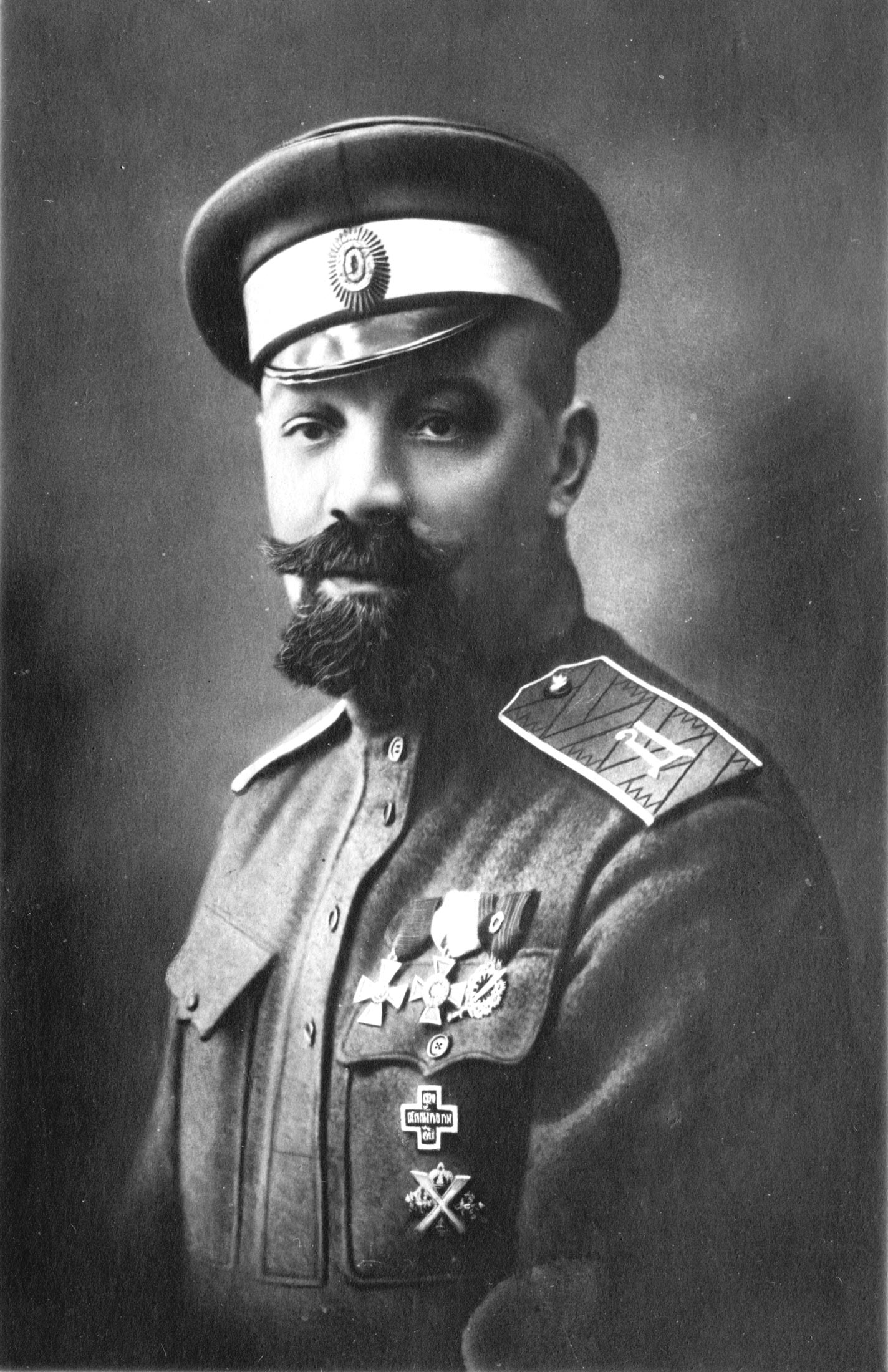
Aleksandr Pavlovich Kutepov (1882–1930)
Aleksandr Pavlovich Kutepov
Source
Source
Aleksandr Kutepov was born on September 16, 1882, to the Russian noble family of Timofeev in Cherepovets, Novgorod Governorate. Kutepov's father died early, and his mother married the forester Kutepov, who then adopted Aleksandr.¹ He studied at the Arkhangelsk gymnasium and later entered the St. Petersburg Infantry Yunker School. Kutepov participated in the Russo-Japanese War (1904–1905). In 1906, Kutepov was transferred to the Preobrazhenskii Life Guards Regiment for “combat distinctions”.² Being part of the regiment, he took part in the First World War, rising to the position of commander by 1917.³
In December 1917, Kutepov joined the Volunteer Army with the rank of colonel. He participated in the Kuban Campaigns, including the Ice March. In April 1918, Kutepov led the Kornilov Shock Regiment. Then, in 1919, he took charge of the Volunteer Corps under the command of General Denikin. On June 23, 1919, Kutepov was promoted to lieutenant general. In March 1920, Kutepov’s corps arrived in Crimea. After the retreat of the Armed Forces of South Russia (VSYuR) from the north of Taurida, Kutepov was appointed commander of the First Russian Army. On November 15, 1920, the army began evacuation to the Gallipoli camp.⁴ Aleksandr Pavlovich was elevated for military merit on November 20, 1920, to the rank of general of the Infantry.⁵
In December 1917, Kutepov joined the Volunteer Army with the rank of colonel. He participated in the Kuban Campaigns, including the Ice March. In April 1918, Kutepov led the Kornilov Shock Regiment. Then, in 1919, he took charge of the Volunteer Corps under the command of General Denikin. On June 23, 1919, Kutepov was promoted to lieutenant general. In March 1920, Kutepov’s corps arrived in Crimea. After the retreat of the Armed Forces of South Russia (VSYuR) from the north of Taurida, Kutepov was appointed commander of the First Russian Army. On November 15, 1920, the army began evacuation to the Gallipoli camp.⁴ Aleksandr Pavlovich was elevated for military merit on November 20, 1920, to the rank of general of the Infantry.⁵
In December 1921, Kutepov arrived in Bulgaria with parts of the corps, and on November 8, 1922, he was appointed assistant to the Commander-in-Chief of the Russian Army. From Bulgaria, Kutepov moved to Belgrade, to the Kingdom of Serbs, Croats, and Slovenes. In 1924, he moved to Paris, where he was relieved of his post by Grand Duke Nikolai Nikolaevich. Over the cause of the Russian immigration, an unspoken rivalry between Wrangel and Kutepov had developed. Kutepov advocated for an underground terrorist struggle in the USSR against the Bolsheviks. From 1924 to 1928, he took part in the activities of the Russian All-Military Union (ROVS) and maintained contact with emigrants and officers of the White Army.⁶ Under the ROVS, the Union of National Terrorists was organized, which was subordinate to Kutepov. The general organized a number of terrorist operations in the territory of the Soviet Union. In the spring of 1928, he was appointed head of the ROVS by order of Grand Duke Nikolai Nikolaevich.⁷
Kutepov was connected to the dummy organization “Monarchist Union of Central Russia” (MOTsR), which was controlled by counterintelligence officers of the Bolsheviks.⁸ On January 26, 1930, Kutepov was kidnapped by agents of the GPU of the USSR. The further fate of the general is still unknown.⁹

Content Oriented Web
Make great presentations, longreads, and landing pages, as well as photo stories, blogs, lookbooks, and all other kinds of content oriented projects.
[1] Rybas, Svyatoslav. General Kutepov. Zhizn’ zamechatel’nykh lyudey: seriya biograficheskaya 1266. Moskva: Molodaya gvardiya, 2010. P. 8
[2] Gagkuyev, Ruslan, Vasiliy Tsvetkov, and Vasiliy Golitsyn. General Kutepov. Moskva: Posev, 2009. P. 11
[3] Rutych, Nikolay. Biograficheskiy spravochnik vysshikh chinov Dobrovol’cheskoy armii i Vooruzhonnykh sil Yuga Rossii: Materialy k istorii belogo dvizheniya. Moskva: Regnum, 1997. P.131-132
[4] Orlov, Grigoriy. ‘General Kutepov (K 25-letiyu so dnya gibeli)’. Chasovoy. Organ svyazi Rossiyskogo Natsional’nogo Dvizheniya., no. 351(3) (March 1955): 4–7.
[5] Volodikhin, Dmitriy. ‘Dusha belogo dela. General Kutepov’. Istoricheskoye obozreniye, no. 8 (2007). https://cyberleninka.ru/article/n/dusha-belogo-dela-general-kutepov.
[6] Gagkuyev, Ruslan, Vasiliy Tsvetkov, and Vasiliy Golitsyn. General Kutepov. Moskva: Posev, 2009. P. 195.
[7] Volodikhin, Dmitriy. ‘Dusha belogo dela. General Kutepov’. Istoricheskoye obozreniye, no. 8 (2007). https://cyberleninka.ru/article/n/dusha-belogo-dela-general-kutepov.
[8] Orlov, Grigoriy. ‘General Kutepov (K 25-letiyu so dnya gibeli)’. Chasovoy. Organ svyazi Rossiyskogo Natsional’nogo Dvizheniya., no. 351(3) (March 1955): 4–7.
[9] Rutych, Nikolay. Biograficheskiy spravochnik vysshikh chinov Dobrovol’cheskoy armii i Vooruzhonnykh sil Yuga Rossii: Materialy k istorii belogo dvizheniya. Moskva: Regnum, 1997.